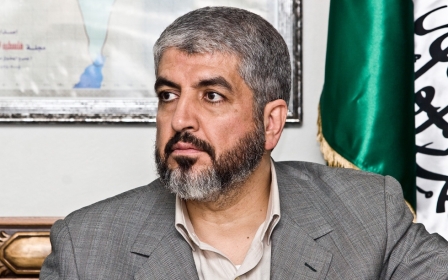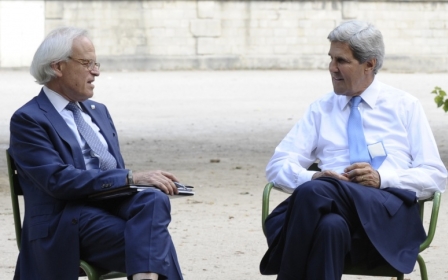Israel accuses UN envoy of 'stoking tensions' between Israelis and Christians

An Israeli official has criticised the UN’s special envoy to the Middle East for his remarks following an alleged denial of access by Israeli security services to the Church of the Holy Sepulchure.
Ron Proser, Israel’s UN ambassador, criticised special envoy Robert Serry in a letter sent to UN General Secretary Ban Ki Moon.
“Against this backdrop, and instead of taking constructive actions to help mitigate the sensitive situation, Robert Serry, the UN's special envoy to the Middle East, took disruptive steps that exacerbated tensions on the ground,” read the letter, “It is unfortunate that a UN official abused his position and the UN platform to express personal opinions.”
Israel on Tuesday accused the UN Mideast peace envoy of stoking tensions between Israel and Christians over a dispute that arose during Easter celebrations in Jerusalem.
UN envoy Robert Serry said he and other diplomats had joined an Easter procession at the invitation of Jerusalem's Palestinian Christian community but were denied access to the Church of the Holy Sepulchre at a police checkpoint.
Stay informed with MEE's newsletters
Sign up to get the latest alerts, insights and analysis, starting with Turkey Unpacked
A letter to UN secretary general Ban Ki-moon from Israel's UN ambassador Ron Prosor -- made public Tuesday by the Israeli foreign ministry -- said that on the day of the Holy Fire ceremony on April 19, the narrow lanes of Jerusalem's walled Old City were packed with worshippers and crowd control was a major challenge.
"Against this backdrop, and instead of taking constructive actions to help mitigate the sensitive situation, Robert Serry, the UN's special envoy to the Middle East, took disruptive steps that exacerbated tensions on the ground," the letter said.
"It is unfortunate that a UN official abused his position and the UN platform to express personal opinions."
The Church of the Holy Sepulchre, one of Christianity's holiest sites, is shared by six denominations -- the Greek Orthodox, Roman Catholic, Armenian Orthodox, Egyptian Copts, Syrian Orthodox and Ethiopian Orthodox.
Serry said at the time that the group he was accompanying was stopped at a security checkpoint before the church "despite earlier assurances... of unhindered access."
"The Israeli police refused to allow such entry claiming they had orders to that effect," he said.
Extremists threaten Christians
The controversy comes against a backdrop of unrest and threats against Christian groups within Israel.
Suspected Jewish extremists attacked and vandalised Tabgha church on the shores of the Sea of Galilee, where Jesus is believed by Christians to have performed the miracles of the loaves and fishes.
Church officials said a group of religious Jews in their early teens had damaged crosses there and attacked clergy.
And in Nazareth, also in northern Israel, police arrested a Jewish man in his 40s for threatening Roman Catholic Bishop Giacinto-Boulos Marcuzzo and members of his faith.
"A suspect arrived at (Marcuzzo's) house and delivered a threatening letter" on Sunday, Rosenfeld told AFP, saying the man was arrested in the nearby town of Safed.
In the letter, the suspect said all Christians, "except Protestants and Anglicans," should leave Israel by May 5 and said that if Marcuzzo and his community did not comply, they would all be "killed by the heavens" -- a term for God.
There are also other Christian communities in Israel, such as the Eastern Orthodox, Armenians and Copts.
The letter, which was signed by "the Messiah, Son of David," quoted Jewish sources who hold that Christianity is a form of idolatry and should be banned.
The suspect said the message must be distributed to the community through the media by 1700 GMT Tuesday, saying every hour of delay would "cost the lives of 100 Christian souls."
Reacting to the vandalism, police spokesman Rosenfeld said "crimes committed for nationalist motives are extremely serious."
Justice Minister Tzipi Livni also condemned the incidents.
"Whoever did these deeds is not part of my people," she wrote on her Facebook page, pledging to "catch and punish" those responsible.
Speaking for the Catholic church, Wadie Abu Nassar criticised the attacks as "very dangerous" and the Israeli establishment for its "lack of will" to act against those inciting them -- "especially radical rabbis and preachers."
"The security establishment is not acting sufficiently" to arrest and indict those responsible, he told AFP.
Politically motivated acts of vandalism with their trademark Hebrew graffiti are euphemistically known as "price tag" attacks.
Israeli Arab divisions
The vast majority of Israel’s Christians are Arabs originating from historical Palestine and, as a whole, Christians make up 2.1% of Israel’s population.
A bill passed by the Knesset in Feburary giving Israeli Christians unique representation on the Advisory Committee for Equal Opportunity in Employment Commission, was slammed by its critics as sectarian as it would for the first define Israel's Christian Arab population as a non-Arab minority within the country.
This was followed by attempts last week by the Israeli government to recruit greater numbers of Arab Christians into the armed forces.
The Palestinian population of Israel are largely exempt from military service and Palestinian Christians have traditionally been part of this exemption.
The move has also been seen as a way of separating out Christians from the other Palestinians groups.
The controversial priest Father Gabriel Nadaf, head of the Israeli Christians Recruitment Forum, applauded the move. Speaking on Israeli Army Radio, he said, "I welcome this important, historical step ... for the Christian community to be a member of Israeli society, equal in rights and duties.
He emphasised that Christians should see themselves as Israeli first and foremost. "We are not Arabs. We are not Palestinians. We are Israelis, citizens of this country and we see ourselves as loyal to this country and its institutions as any Christian living in any other place in the world would."
Middle East Eye delivers independent and unrivalled coverage and analysis of the Middle East, North Africa and beyond. To learn more about republishing this content and the associated fees, please fill out this form. More about MEE can be found here.




